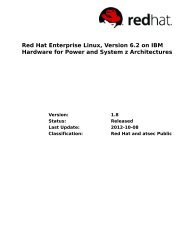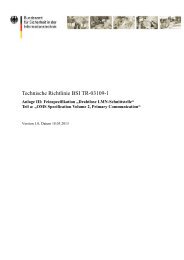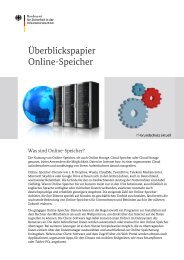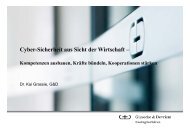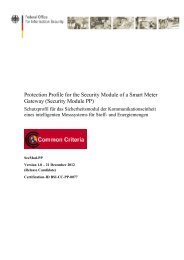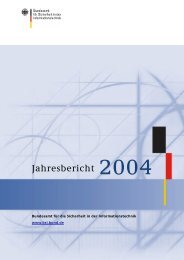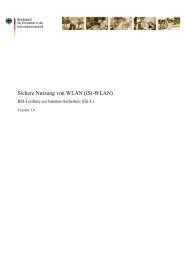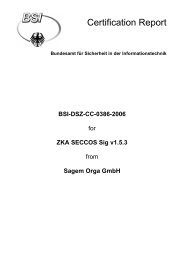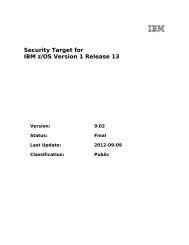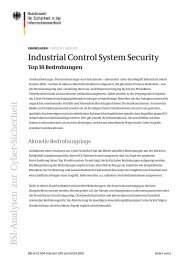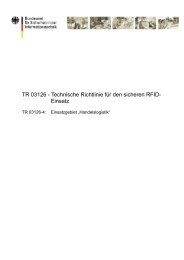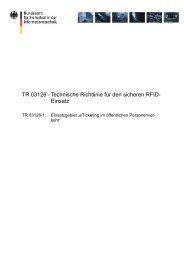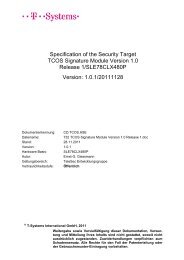VS-NfD-Merkblatt Englisch - Bundesamt für Sicherheit in der ...
VS-NfD-Merkblatt Englisch - Bundesamt für Sicherheit in der ...
VS-NfD-Merkblatt Englisch - Bundesamt für Sicherheit in der ...
Create successful ePaper yourself
Turn your PDF publications into a flip-book with our unique Google optimized e-Paper software.
Instruction sheet on the Handl<strong>in</strong>g of Protectively Marked Information<br />
Classified<br />
<strong>VS</strong>-NUR FÜR DEN DIENSTGEBRAUCH (RESTRICTED)<br />
(short title: <strong>VS</strong>-<strong>NfD</strong>-<strong>Merkblatt</strong>;<br />
Instructions on the Handl<strong>in</strong>g of RESTRICTED <strong>in</strong>formation)<br />
This <strong>in</strong>struction sheet is <strong>in</strong>tended to <strong>in</strong>form members of public agencies about the general<br />
handl<strong>in</strong>g of protectively marked <strong>in</strong>formation classified <strong>VS</strong>-NUR FÜR DEN<br />
DIENSTGEBRAUCH (<strong>VS</strong>-<strong>NfD</strong> – RESTRICTED), and <strong>in</strong> particular for the draft<strong>in</strong>g of contracts<br />
with private companies and organisations on the provision of services classified<br />
as <strong>VS</strong>-NUR FÜR DEN DIENSTGEBRAUCH (<strong>VS</strong>-<strong>NfD</strong> – RESTRICTED). The provisions<br />
conta<strong>in</strong>ed <strong>in</strong> these <strong>in</strong>structions should be taken <strong>in</strong>to account when draft<strong>in</strong>g such a contract.<br />
I. General<br />
1. Access and Disclosure<br />
1.1. Items classified <strong>VS</strong>-NUR FÜR DEN DIENSTGEBRAUCH (<strong>VS</strong>-<strong>NfD</strong> –<br />
RESTRICTED) shall only be made accessible to such persons as must, <strong>in</strong> connection<br />
with the execution or negotiation of the given contract, have access to such <strong>in</strong>formation<br />
(“need-to-know” pr<strong>in</strong>ciple). Persons authorized to have access shall be <strong>in</strong>formed of this<br />
Instruction Sheet before they get access to such classified <strong>in</strong>formation; the fact that they<br />
have been <strong>in</strong>formed of this Instruction Sheet shall be kept on record; it shall be po<strong>in</strong>ted<br />
out to them that they bear a special responsibility for the protection of the classified<br />
items pursuant to this Instruction Sheet and that any violation of the provisions conta<strong>in</strong>ed<br />
there<strong>in</strong> may result <strong>in</strong> consequences un<strong>der</strong> crim<strong>in</strong>al law or the law of contracts.<br />
Any further measures such as a security procedure of the Fe<strong>der</strong>al M<strong>in</strong>ister of Economics<br />
and Technology, security screen<strong>in</strong>gs or the formal announcement of visits are not<br />
required with this classification level.<br />
1.2 The contents of the given classified item shall be kept secret from outsi<strong>der</strong>s. Staff<br />
members who have proved to be unsuited for handl<strong>in</strong>g such classified items or who<br />
have failed to comply with their duty to observe secrecy, shall be excluded from work on<br />
the respective classified items.<br />
1.3 Items that are classified <strong>VS</strong>-NFD (RESTRICTED) may be disclosed only to government<br />
agencies, <strong>in</strong>tergovernmental organisations or contractors which are <strong>in</strong>volved <strong>in</strong><br />
a programme/project/contract and must have access to the classified <strong>in</strong>formation <strong>in</strong><br />
connection with such programme/project or contract. Prior to the disclosure of items<br />
classified <strong>VS</strong>-NFD (RESTRICTED) to <strong>in</strong>tergovernmental organisations that are not <strong>in</strong>volved<br />
<strong>in</strong> the programme/project/contract or to contractors from countries that are not<br />
<strong>in</strong>volved <strong>in</strong> the programme/project/contract, the written consent of the contract<strong>in</strong>g authority<br />
(i. e. the authority which has awarded the classified contract) shall be obta<strong>in</strong>ed.<br />
As a matter of pr<strong>in</strong>ciple, a security agreement shall be required <strong>in</strong> this context (cf. also<br />
section 23 of the General Adm<strong>in</strong>istrative Regulations Govern<strong>in</strong>g the Material and Organisational<br />
Safeguard<strong>in</strong>g of Classified Information).<br />
- 2 -
- 2 -<br />
1.4 In Germany, the Fe<strong>der</strong>al M<strong>in</strong>istry of Economics and Technology can ascerta<strong>in</strong><br />
whether the provisions of this Instruction Sheet are complied with by contractors which<br />
have been awarded a classified contract. In cases where the contract is awarded by a<br />
public authority, the latter may exercise the control rights pursuant to sentence 1.<br />
1.5 The security grad<strong>in</strong>g shall expire thirty years after the first day of January of the<br />
year which follows the date of classification, unless another term has been def<strong>in</strong>ed. In<br />
the case of <strong>in</strong>ternational contracts, the Fe<strong>der</strong>al M<strong>in</strong>istry of Economics and Technology<br />
shall be consulted if there are no programme or project-related security <strong>in</strong>structions <strong>in</strong><br />
place (cf also section 26 of the General Adm<strong>in</strong>istrative Regulations Govern<strong>in</strong>g the Material<br />
and Organisational Safeguard<strong>in</strong>g of Classified Information).<br />
Process<strong>in</strong>g of classified <strong>in</strong>formation<br />
2.1 Mark<strong>in</strong>g and Handl<strong>in</strong>g/Storage<br />
Documents and material classified <strong>VS</strong>-NFD (RESTRICTED) shall be marked, handled<br />
and stored as follows:<br />
2.1.1 Documents shall be marked with the stamped or pr<strong>in</strong>ted security grad<strong>in</strong>g “<strong>VS</strong>-<br />
NUR FÜR DEN DIENSTGEBRAUCH” <strong>in</strong> blue or black at the top of each written page<br />
and of all annexes similarly classified; <strong>in</strong>ternational or foreign classified documents shall<br />
be re-stamped with the correspond<strong>in</strong>g German mark<strong>in</strong>g. In the case of books, brochures<br />
etc. it shall be sufficient to apply the mark<strong>in</strong>g to the cover and the front page. In<br />
cases where every written page of a foreign book or brochure carries the foreign security<br />
grad<strong>in</strong>g, it shall be sufficient to apply the German security grad<strong>in</strong>g to the cover or the<br />
front page.<br />
2.1.2. Material classified <strong>VS</strong>-<strong>NfD</strong> (RESTRICTED) (e.g. equipment) or data media (e.g.<br />
discs, CDs, microchips, microfiches) shall also be clearly marked or re-stamped either<br />
on the material itself or, where this is not possible, on the storage conta<strong>in</strong>ers of the material.<br />
2.1.3. Classified <strong>in</strong>formation shall be stored <strong>in</strong> locked rooms or conta<strong>in</strong>ers (cab<strong>in</strong>ets,<br />
desks, etc.). Outside such rooms or conta<strong>in</strong>ers it shall at all times be stored and handled<br />
<strong>in</strong> such a way that unauthorized persons do not get access to and are not able to<br />
observe the contents of classified <strong>in</strong>formation.<br />
2.1.4 Interim material (e. g. prelim<strong>in</strong>ary drafts, shorthand notes, sound record<strong>in</strong>g material,<br />
overlays) shall be afforded the same protection aga<strong>in</strong>st observation of their contents<br />
by unauthorized persons as is given to the respective job file. Interim material that<br />
is not passed on to third parties and is immediately destroyed needs not to be marked<br />
as classified.<br />
2.2 Transmission<br />
2.2.1. Inside Germany, transmission shall be by couriers or by a postal service, <strong>in</strong> a<br />
closed envelope or conta<strong>in</strong>er. The envelope or conta<strong>in</strong>er shall not bear any security<br />
mark<strong>in</strong>g.<br />
- 3 -
- 3 -<br />
2.2.2. Classified items may be dispatched to foreign addresses by private courier companies<br />
as standard letter or parcel or by air or sea freight unless the contract<strong>in</strong>g authority<br />
has expressly objected to this type of shipment or laid down other modalities govern<strong>in</strong>g<br />
the dispatch to foreign addresses. In this context, the contract<strong>in</strong>g authority shall take<br />
<strong>in</strong>to account any <strong>in</strong>tergovernmental agreements and/or special programme or projectrelated<br />
security <strong>in</strong>structions.<br />
2.3 Destruction/Return<br />
2.3.1. In or<strong>der</strong> to avoid extensive hold<strong>in</strong>gs of classified material, any classified items<br />
that are no longer required shall be destroyed or returned to the contract<strong>in</strong>g authority.<br />
2.3.2 Classified items, <strong>in</strong>clud<strong>in</strong>g <strong>in</strong>terim material, shall be destroyed <strong>in</strong> such a way that<br />
the contents are no longer recognisable and cannot be ren<strong>der</strong>ed recognisable aga<strong>in</strong>.<br />
2.4 Loss, unauthorized disclosure, discovery of classified items or failure to<br />
comply with this Instruction Sheet<br />
Any loss, unauthorized disclosure and discovery of classified items and any failure to<br />
comply with this Instruction Sheet shall be immediately reported through the security<br />
officer of the public authority or the private organisation concerned – if it has appo<strong>in</strong>ted<br />
such a security officer – to the German contract<strong>in</strong>g authority and to the Fe<strong>der</strong>al M<strong>in</strong>istry<br />
of Economics and Technology (unit VI B 3), <strong>in</strong> or<strong>der</strong> to conta<strong>in</strong> any potential damage<br />
and to <strong>in</strong>vestigate the <strong>in</strong>cident.<br />
2.5 Visits<br />
Visits abroad or from abroad which <strong>in</strong>volve access to material classified <strong>VS</strong>-<strong>NfD</strong><br />
(RESTRICTED) or material similarly classified shall as a rule be agreed between the<br />
send<strong>in</strong>g <strong>in</strong>stitution and the <strong>in</strong>stitution that is to be visited. There are no specific formal<br />
regulations.<br />
2.6 Contracts<br />
2.6.1. The contract<strong>in</strong>g authority shall place all contractors and sub-contractors which<br />
have been awarded a classified contract, un<strong>der</strong> the contractual obligation to comply with<br />
the regulations of this Instruction Sheet. In this context, it shall be po<strong>in</strong>ted out that any<br />
failure to comply with this Instruction Sheet may result <strong>in</strong> the cancellation of the contract<br />
or of parts thereof.<br />
2.6.2. In the case of proposals or calls for proposals and follow<strong>in</strong>g contract execution<br />
classified items shall be stored as prescribed, destroyed or returned as soon as possible,<br />
unless and until they are downgraded.<br />
2.6.3. Foreign contractors and sub-contractors shall be bound by contract to comply<br />
with the regulations issued by their competent security agency on the handl<strong>in</strong>g of items<br />
similarly classified. In cases where there is no comparable security grad<strong>in</strong>g <strong>in</strong> the country<br />
of a contractor/sub-contractor, the Fe<strong>der</strong>al M<strong>in</strong>istry of Economics and Technology<br />
(unit VI B 3) shall be <strong>in</strong>volved; the latter shall then proceed to agree with the competent<br />
foreign security authority on the necessary security regulations. In such cases, the classified<br />
items may be disclosed only once the Fe<strong>der</strong>al M<strong>in</strong>istry of Economics and Technology<br />
has given its consent.<br />
- 4 -
- 4 -<br />
II. Use of Information Technology (IT)<br />
1. Process<strong>in</strong>g<br />
1.1 If <strong>in</strong>formation technology is used for process<strong>in</strong>g items classified <strong>VS</strong>-<strong>NfD</strong><br />
(RESTRICTED), appropriate IT measures and/or physical and organizational measures<br />
shall be taken <strong>in</strong> or<strong>der</strong> to ensure the protection of the classified <strong>in</strong>formation (cf. part I<br />
paras 1.1 and 1.2).<br />
1.2. Prior to the process<strong>in</strong>g or storage of items classified <strong>VS</strong>-<strong>NfD</strong> (RESTRICTED), it<br />
shall be ensured that the computer or the <strong>in</strong>ternal network are not directly l<strong>in</strong>ked to the<br />
Internet (e.g. without firewall protection), if no further measures pursuant to para. 3.3.<br />
have been taken.<br />
1.3. The follow<strong>in</strong>g measures, <strong>in</strong> particular, shall be consi<strong>der</strong>ed when process<strong>in</strong>g items<br />
classified <strong>VS</strong>-<strong>NfD</strong> (RESTRICTED):<br />
● list<strong>in</strong>g of the persons authorized to have access;<br />
● use of identification and authentication mechanisms (e.g. log-<strong>in</strong>, password);<br />
● an appropriate IT Security Instruction (for the <strong>in</strong>dividual workplace or for<br />
the company as a whole).<br />
Radio keyboards and radio networks may be used only if they are accredited by the<br />
<strong>Bundesamt</strong> <strong>für</strong> <strong>Sicherheit</strong> <strong>in</strong> <strong>der</strong> Informationstechnik (BSI – Fe<strong>der</strong>al Office for Information<br />
Security).<br />
1.4 In cases where portable IT systems (such as notebooks or handhelds) are used<br />
for the process<strong>in</strong>g or storage of data classified <strong>VS</strong>-<strong>NfD</strong> (RESTRICTED), the storage<br />
media used shall be encrypted by means of BSI-accredited products. Where BSIaccredited<br />
programmes and equipment are not available, it shall be permissible to use<br />
products that have been certified by the BSI accord<strong>in</strong>g to the Common Criteria, m<strong>in</strong>imum<br />
Assurance Level EAL 3.<br />
1.5 Portable data media (e.g. discs, CDs, removable discs) conta<strong>in</strong><strong>in</strong>g data classified<br />
<strong>VS</strong>-<strong>NfD</strong> (RESTRICTED) <strong>in</strong> an unencrypted form shall be marked as laid down <strong>in</strong> part I<br />
para. 2.1.2. and be stored <strong>in</strong> accordance with part I para. 2.1.3.<br />
1.6 The erasure of portable data media shall be effected by means of software products<br />
that provide at least for a twofold overwrite. For this purpose, BSI-recommended<br />
products should be used.<br />
1.7 IT equipment and data media shall be checked for viruses (<strong>in</strong> particular Trojan<br />
Horses or worms) before they are used for process<strong>in</strong>g <strong>in</strong>formation classified <strong>VS</strong>-<strong>NfD</strong><br />
(RESTRICTED). This check shall be repeated at regular <strong>in</strong>tervals.<br />
1.8 Private IT equipment (e.g. laptops), software or data media must not be used for<br />
process<strong>in</strong>g <strong>in</strong>formation classified <strong>VS</strong>-<strong>NfD</strong> (RESTRICTED). Private software or private<br />
data media must not be used on Information systems that are used for process<strong>in</strong>g <strong>in</strong>formation<br />
classified <strong>VS</strong>-<strong>NfD</strong> (RESTRICTED).<br />
- 5 -
- 5 -<br />
1.9 On fixed data media conta<strong>in</strong><strong>in</strong>g data classified <strong>VS</strong>-<strong>NfD</strong> (RESTRICTED) <strong>in</strong> an unencrypted<br />
form, the classified <strong>in</strong>formation shall be deleted <strong>in</strong> accordance with para. 1.6<br />
before the data media, for the purpose of ma<strong>in</strong>tenance or repair work on IT system<br />
components, leave the perimeter of persons authorized to have access. If deletion is not<br />
possible, the data media shall be removed and reta<strong>in</strong>ed or the company entrusted with<br />
the ma<strong>in</strong>tenance/repair work shall be placed un<strong>der</strong> the contractual obligation to comply<br />
with the provisions of this Instruction Sheet.<br />
2. Transmission<br />
2.1 For the electronic transmission over telecommunications or other technical communication<br />
l<strong>in</strong>es (<strong>in</strong>clud<strong>in</strong>g onl<strong>in</strong>e services such as WWW, FTP, TELNET, E-mail etc.)<br />
<strong>in</strong>side Germany the classified <strong>in</strong>formation shall be encrypted by means of a cryptological<br />
system that is accredited and certified by the BSI (section 40 of the General Adm<strong>in</strong>istrative<br />
Regulations Govern<strong>in</strong>g the Material and Organisational Safeguard<strong>in</strong>g of Classified<br />
Information) or released by the Fe<strong>der</strong>al M<strong>in</strong>istry of Economics and Technology. In<br />
<strong>der</strong>ogation of these provisions, unencrypted transmission is admissible on an exceptional<br />
basis <strong>in</strong> cases where:<br />
a) telephone conversations, video conferences, telecopies and telexes are to be<br />
transmitted via fixed networks and there are no encryption facilities available for the required<br />
transmission mode between the sen<strong>der</strong> and the addressee and where the contract<strong>in</strong>g<br />
authority has not explicitly stated an encryption requirement at the time when<br />
the contract was awarded. Before the transmission, the transmitt<strong>in</strong>g party shall, if possible,<br />
ascerta<strong>in</strong> that it is connected to the desired addressee;<br />
b) transmission is conf<strong>in</strong>ed to an Intranet (LAN) that is only operated on an <strong>in</strong>tegrated,<br />
company-owned campus and whose transmission facilities are protected<br />
aga<strong>in</strong>st direct unauthorized access.<br />
2.2 In the case of <strong>in</strong>ternational electronic transmissions the encryption procedures<br />
shall be agreed between the national security agencies of the states <strong>in</strong>volved. To the<br />
extent that specific security <strong>in</strong>structions concern<strong>in</strong>g transmission have been agreed <strong>in</strong><br />
the context of a programme/project, they shall be complied with. If required, the Fe<strong>der</strong>al<br />
M<strong>in</strong>istry of Economics and Technology (unit VI B 3) shall provide additional <strong>in</strong>formation.<br />
3. Measures to ensure protection of confidentiality<br />
The measures recommended here serve to ensure the confidentiality of electronically<br />
stored classified <strong>in</strong>formation. They are not primarily aimed at guarantee<strong>in</strong>g the <strong>in</strong>tegrity<br />
and availability of the data.<br />
One needs to dist<strong>in</strong>guish three different scenarios:<br />
3.1 Stand-alone-PCs or networks with closed user groups that are not l<strong>in</strong>ked to<br />
other networks<br />
- The operat<strong>in</strong>g system must ensure a differentiated user profile and access protection<br />
down to the file level <strong>in</strong> or<strong>der</strong> to make sure that the “need-to-know”-pr<strong>in</strong>ciple is<br />
complied with (e. g. Unix/L<strong>in</strong>ux, W<strong>in</strong> NT, W<strong>in</strong> 2000, W<strong>in</strong> XP)<br />
- There must be a log<strong>in</strong> and a password. The password must conta<strong>in</strong> at least 6<br />
alphanumerical spaces, special characters; majuscules and m<strong>in</strong>uscules.<br />
- 6 -
- 6 -<br />
- The BIOS must also be protected by a password.<br />
- As a matter of pr<strong>in</strong>ciple, boot<strong>in</strong>g of the IT system shall be possible only from the<br />
fixed disc.<br />
- If possible, it should conta<strong>in</strong> a RAM disc for the Temp files (which would make it<br />
easier and more convenient for the user to reliably delete files)<br />
- An updated anti-virus programme must be <strong>in</strong>stalled<br />
- In the case of networks, a separate partition for the storage of classified data<br />
should be <strong>in</strong>stalled on the server.<br />
3.2 Intranets with external e-mail-l<strong>in</strong>k<br />
In addition to the measures def<strong>in</strong>ed un<strong>der</strong> item 3.1,<br />
- there needs to be a server-based network, with the server located <strong>in</strong> a controlledaccess<br />
area;<br />
- there must be a firewall either on the server or <strong>in</strong> the form of a separate ITsystem<br />
(and if necessary an additional e-mail-server), also <strong>in</strong> a controlled-access area;<br />
a packet filter needs to be employed; an application gateway is possible;<br />
- any other IP-address apart from the server-IP must be concealed to the outside<br />
world (DNS-server);<br />
- data classified <strong>VS</strong>-<strong>NfD</strong> (RESTRICTED) shall be transmitted <strong>in</strong> an encrypted form;<br />
only products released by the Fe<strong>der</strong>al M<strong>in</strong>istry of Economics and Technology may be<br />
used for encrypt<strong>in</strong>g such data; the encryption keys shall not be stored on the fixed disc.<br />
With<strong>in</strong> the company, there is a need to lay down b<strong>in</strong>d<strong>in</strong>g user <strong>in</strong>structions and to tra<strong>in</strong><br />
the staff accord<strong>in</strong>gly. The most recent security updates of the software employed shall<br />
be <strong>in</strong>stalled as soon as they are available and the firewall shall be adjusted accord<strong>in</strong>gly.<br />
3.3 Standalone PCs or Intranets with e-mail- and Internet-l<strong>in</strong>k<br />
In addition to the measures def<strong>in</strong>ed un<strong>der</strong> item 3.1. and 3.2,<br />
- there must be a firewall and an application gateway;<br />
- the regulations conta<strong>in</strong>ed <strong>in</strong> the BSI Basel<strong>in</strong>e Protection Manual for Passwords;<br />
must be applied<br />
- data classified <strong>VS</strong>-<strong>NfD</strong> (RESTRICTED) must be kept <strong>in</strong> a separate partition on<br />
the server or <strong>in</strong> a specially protected data area; the relevant protection mechanisms are<br />
to be applied accord<strong>in</strong>gly.<br />
Depend<strong>in</strong>g on the number of PCs <strong>in</strong>volved, it will be necessary to set up a separate<br />
VPN for a specific user group or project.


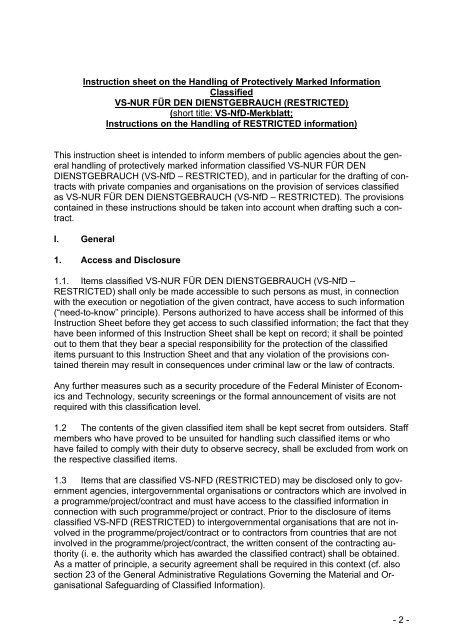
![[ST] System z10 EC LPAR Security Target V7.7.2 20081023 PU-205](https://img.yumpu.com/16227170/1/184x260/st-system-z10-ec-lpar-security-target-v772-20081023-pu-205.jpg?quality=85)
